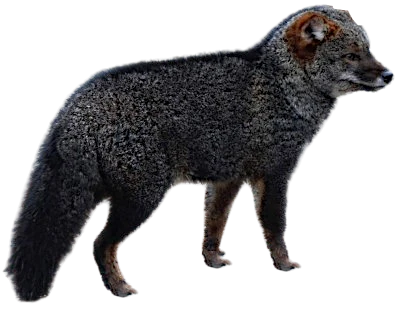
Darwin's Fox (Lycalopex fulvipes) is a canid endemic to the temperate forests of Chile. This fox is known for its small size and distinctive coat.
Darwin's Fox is distinguished by its gray coat with hints of russet and white. It measures approximately 50 to 60 cm in length, including its tail, and weighs between 2.5 and 4 kg. Its tail is long and bushy, often with a black tip.
Darwin's Fox belongs to the Canidae family.
This fox is one of the rarest carnivore species in South America.
Darwin's Fox is primarily found in the temperate forests of Chile, particularly in the Nahuelbuta and Coastal Range regions. It prefers wooded areas with dense vegetation, which provides good cover and food resources.
This canid is primarily solitary but can form family groups during the breeding season. Active mainly at dusk and dawn, Darwin's Fox is an opportunistic hunter, using its keen hearing to locate prey under vegetation.
As an omnivore, Darwin's Fox feeds on a variety of prey: rodents, birds, insects, fruits, and berries. This diverse diet illustrates its ability to thrive in changing environments.
Darwin's Fox is classified as critically endangered by the IUCN. The main threats include habitat loss due to deforestation, diseases, and vehicle collisions. Conservation efforts are underway to protect this rare species.
Darwin's Fox belongs to the genus Lycalopex, which also includes the Culpeo (Lycalopex culpaeus). These two species share similar characteristics, although the Culpeo is more widespread and less threatened.
To observe Darwin's Fox in its natural habitat, follow these tips:
By following these recommendations, you can admire this fascinating animal while minimizing disturbances.